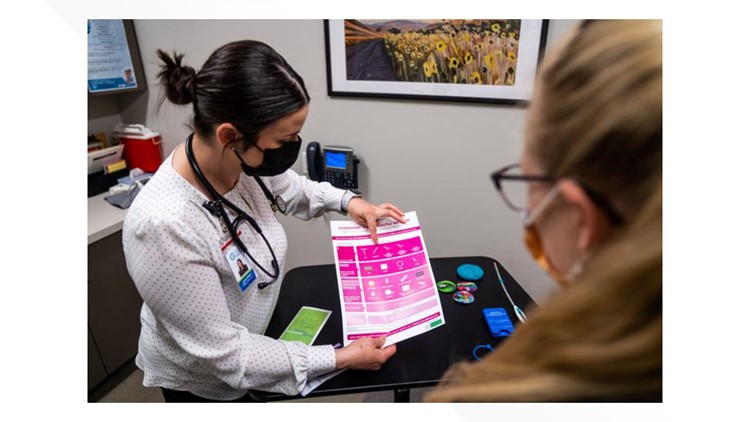BOISE, Idaho — This story originally ran in the Idaho Press.
Birth control and family planning are inextricably linked, but some Idahoans face obstacles accessing contraceptives.
Those obstacles were accentuated during the legislative session, when legislators killed a bill, SB 1260, that would have extended birth control prescription maximums to six months. The bill failed 24-44.
The Centers for Disease Control and Prevention has named family planning one of 10 great public health achievements of the 20th century. However, some residents experience financial barriers, a lack of knowledge or transportation issues. This lack of access can have profound impacts on public health.
Contraceptives allow women to have the number of children they want when they’re ready, said Gina Pannell, Central District Health division administrator of family and clinic services.
For example, a lot of unintended pregnancies can happen to women who wanted a second child, but not as soon as it happened, she said.
“It has the ability to impact a family, right, if you’re already struggling to care for that one child and afford all the things that are related,” Pannell said. “Now you have a second one. ... Contraception allows the choice to create that reproductive life plan.”
But being ready can entail more than just being emotionally ready to have children. For example, women on birth control can wait to have children until they have their mental health in check or until they’ve stopped using tobacco.
Some women choose to wait until they can improve their physical health, Pannell said.
“Having a child without the means to be able to raise them or just have them as an addition to taking care of yourself is a big burden on individuals who are not ready,” Pannell said. “It has long-term impacts, as far as your ability to contribute to the economy.”
In addition, contraceptives have lowered maternal mortality, in part because prenatal care is not just for the infant. Women who are able to wait until they can afford the prenatal care will receive medical attention during checkups.
But contraceptive access can have benefits on more than just an individual level.
A child born on Medicaid will likely stay on Medicaid, Pannell said.
“It’s really hard to kind of get out of this cycle of poverty,” Pannell said.
Issues with access
A year’s supply of contraceptives is cost-effective and improves adherence and continuation rates, according to the American College of Obstetricians and Gynecologists. For example, in rural counties, people who can only get prescriptions for periods of time like three months can face obstacles with transportation or needing to see someone in person.
Most birth control users in Idaho have to refill their prescription monthly, said Mistie DelliCarpini-Tolman, Idaho state director for Planned Parenthood Alliance Advocates.
“So obviously having to refill every month or every two months, that’s a burden that makes perfect use challenging,” DelliCarpini-Tolman said. “Amidst the COVID-19 crisis, pharmacy wait times have skyrocketed. Even shipping delays are slowing down the delivery of mail order prescriptions.”
If used perfectly, the birth control pill is 99% effective in preventing pregnancy. However, with typical use, the pill is less effective.
Perfect use would include taking the pill at the same time each day and never missing a dose.
The American Civil Liberties Union previously supported a 2021 version of the bill that would have expanded access to 12 months.
“Meaningful access to contraception is integral to our vision of a world in which people are free to express their sexuality, form intimate relationships, lead healthy sexual lives and decide whether and when to have children,” the ACLU of Idaho wrote on its website.
Increasing the supply to six months would be "a good step in the right direction," ACLU of Idaho Policy Strategist Lauren Bramwell said.
In 2010, Gem State women had 12,000 unintended pregnancies, according to the CDC. Research shows more than 90% of abortions are in cases of unintended pregnancies.
"Legislators say time and time again that they want to decrease the number of abortions in our state," Bramwell said. "But when measures are introduced that would decrease the number of unintended pregnancies, those measures fail."
But there are other barriers to contraceptive access in the Treasure Valley, beyond the length of prescriptions.
Central District Health is a Title X recipient, which means it receives federal funds to support family planning. In practice, this means Central District Health can charge no fee to those whose income qualifies.
But Pannell said Central District Health is the only Title X provider in the Treasure Valley.
“Access has been an issue because if you can’t afford the birth control, then why would you go to an appointment?” Pannell said.
The Treasure Valley is a contraceptive desert, according to the nonprofit Power to Decide. Ada and Canyon counties have closer to one full-range clinic per 5,000 women, but ideally there would be one per 1,000 women.
This ability to access contraceptives can in some ways be a double standard, because male birth control does not serve a purpose beyond preventing birth and sexually transmitted diseases. However, the pill can treat things like painful period symptoms, migraines and endometriosis for women.
“Birth control is not just for contraceptive needs … it is also to address a host of medical issues,” said Tara Mancini, Power to Decide’s director of public policy. “It’s ridiculous in any scenario to not be able to access basic health care.”
Contraceptives are “an integral component of women’s health care,” according to the American College of Obstetricians and Gynecologists.
Stigma is another barrier because people can feel uncomfortable purchasing or requesting contraceptives.
In addition to its clinic in the Treasure Valley, Central District Health has clinics in more remote places like McCall and Mountain Home.
“We’re only up there (in McCall) about once a month on average,” said Savannah Klinginsmith, nurse practitioner with Central District Health. “There can be financial barriers, maybe no insurance because most insurance will cover contraception.”
There’s also a knowledge barrier as far as clients knowing things like how contraception works and how pregnancy occurs, Klinginsmith said. Others don’t know about the services available.
Jassie Singh, nurse practitioner, demonstrates various types of contraceptives in the clinic at Central District Health in Boise on Tuesday.
Idaho access mirrors political trends
Although abortion rights have been longstanding political and ethical battles, recently state legislatures across the U.S. have taken to protesting contraceptive access, according to Vogue.
U.S. Sen. Marsha Blackburn, R-Tenn., last week railed against the Griswold v. Connecticut Supreme Court decision, which gave married women access to contraceptives.
And DelliCarpini-Tolman, with Planned Parenthood, said the decision to vote down the contraceptives bill was a byproduct of the Idaho legislature becoming more extreme.
Extremism and polarization are increasing in the Gem State, the Idaho Press previously reported.
Idaho Reps. Brent Crane and Heather Scott didn’t respond to requests for comment. Both spoke out against the bill during the March 14 Legislative debate.
Crane, R-Nampa, said during the debate that he was frantically communicating with pro-life groups that did not support the bill. He did not specify why.
“I can’t imagine that the pro-life groups are in favor of this bill,” Scott, R-Blanchard, said at the time.
Chelsea Gaona Lincoln, Idaho programs manager for Legal Voice, said she would love to see comprehensive reproductive education in the state as well as expanded access to birth control.
“I think it pairs along with the fact that reproductive and sexual health education has also been under attack in recent leg sessions,” Gaona Lincoln said. “It speaks to the fact that there are those in the state that would like to push their will or beliefs upon the larger population.”
This article originally appeared in the Idaho Press, read more on IdahoPress.com.
Watch more Local News:
See the latest news from around the Treasure Valley and the Gem State in our YouTube playlist:



